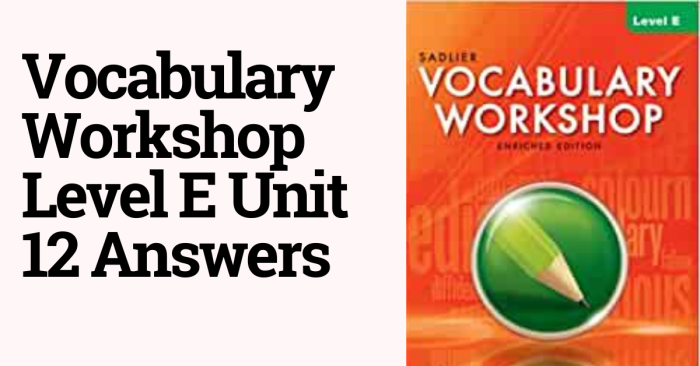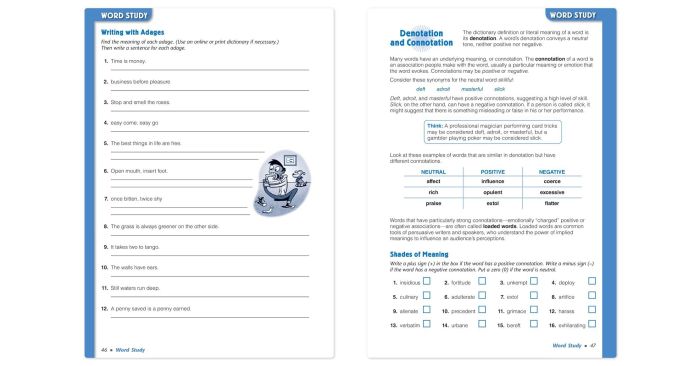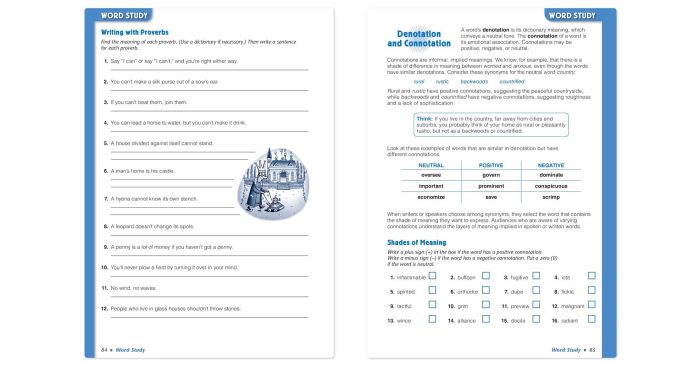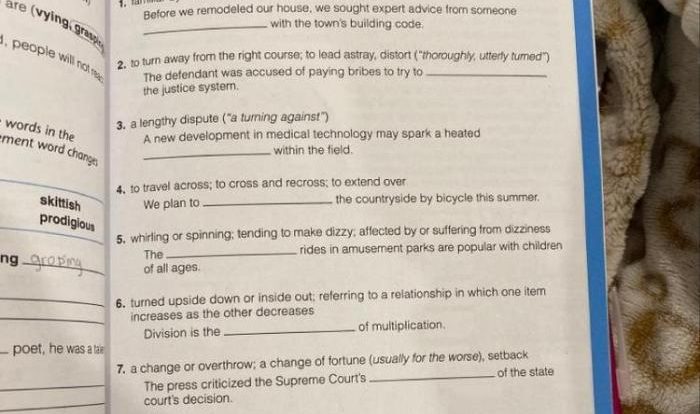Embark on a captivating journey with Vocabulary Workshop Level E Unit 12, a comprehensive guide designed to elevate your vocabulary skills. Through engaging activities and expert insights, this unit empowers you to master new words, expand your vocabulary, and communicate with precision and confidence.
Delve into the intricacies of word usage, explore the relationships between words, and discover strategies for expanding your vocabulary beyond the classroom. Vocabulary Workshop Level E Unit 12 is your passport to unlocking the power of words.
Vocabulary Words and Definitions: Vocabulary Workshop Level E Unit 12
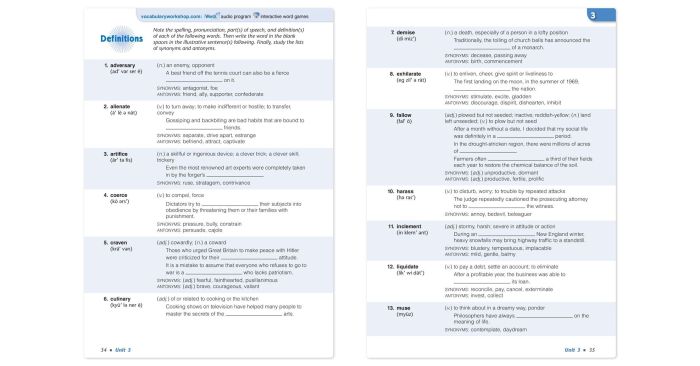
Unit 12 introduces a range of vocabulary words that expand students’ understanding of language and communication. These words cover various aspects of language, including:
Synonyms
- Synonym:A word or phrase that means the same or nearly the same as another word or phrase in the same language.
- Example:“Big” and “large” are synonyms.
Antonyms
- Antonym:A word or phrase that means the opposite of another word or phrase in the same language.
- Example:“Hot” and “cold” are antonyms.
Homophones
- Homophone:A word that has the same sound as another word but has a different meaning and often a different spelling.
- Example:“To,” “too,” and “two” are homophones.
Word Usage in Sentences, Vocabulary workshop level e unit 12
Using vocabulary words correctly in sentences is essential for effective communication. Here are some examples of how to use the vocabulary words from Unit 12 in sentences:
- “The synonymfor ‘happy’ is ‘joyful’.”
- “The antonymof ‘up’ is ‘down’.”
- “The words ‘here’ and ‘hear’ are homophones.”
Word Relationships
Understanding the relationships between words helps students expand their vocabulary and improve their comprehension skills. Here are some examples of word relationships:
- Synonyms:“Big” and “large” are synonyms, meaning they have the same meaning.
- Antonyms:“Hot” and “cold” are antonyms, meaning they have opposite meanings.
- Homophones:“To,” “too,” and “two” are homophones, meaning they sound the same but have different meanings.
Vocabulary in Context
Vocabulary words are not just isolated terms but are used in real-world contexts. Here are some examples of how vocabulary words from Unit 12 can be used in different contexts:
- In a job interview, the candidate might use the word ” synonym” to demonstrate their command of language.
- In a scientific paper, the researcher might use the word ” antonym” to highlight the contrasting effects of two variables.
- In a conversation, friends might use the word ” homophone” to create a playful pun.
Word Study Activities
Engaging activities can reinforce vocabulary learning and make it more memorable. Here are some examples of word study activities:
- Synonym and Antonym Matching:Students match words with their synonyms and antonyms.
- Homophone Riddles:Students solve riddles that use homophones.
- Vocabulary Charades:Students act out vocabulary words for others to guess.
Vocabulary Assessment
Assessing students’ understanding of vocabulary words is crucial for evaluating their progress. Here are some examples of vocabulary assessment methods:
- Vocabulary Quizzes:Short quizzes that test students’ knowledge of word meanings and usage.
- Vocabulary Tests:Comprehensive tests that assess students’ understanding of a larger set of vocabulary words.
- Vocabulary Projects:Projects that allow students to demonstrate their vocabulary skills, such as creating a vocabulary dictionary or writing a story that uses a specific set of vocabulary words.
Vocabulary Enrichment
Expanding vocabulary beyond the words introduced in Unit 12 is essential for lifelong learning. Here are some strategies for vocabulary enrichment:
- Use a Dictionary and Thesaurus:Regularly consult a dictionary to look up unfamiliar words and a thesaurus to find synonyms and antonyms.
- Read Widely:Reading a variety of texts exposes students to new vocabulary words.
- Play Word Games:Games like Scrabble and crossword puzzles challenge students to use and expand their vocabulary.
Key Questions Answered
What is the purpose of Vocabulary Workshop Level E Unit 12?
Vocabulary Workshop Level E Unit 12 aims to enhance your vocabulary skills, improve your word usage, and foster a deeper understanding of language.
What topics are covered in Vocabulary Workshop Level E Unit 12?
Vocabulary Workshop Level E Unit 12 covers a range of topics, including vocabulary words and definitions, word usage in sentences, word relationships, vocabulary in context, word study activities, vocabulary assessment, and vocabulary enrichment.
How can I benefit from completing Vocabulary Workshop Level E Unit 12?
Completing Vocabulary Workshop Level E Unit 12 will provide you with a stronger vocabulary, improved communication skills, and a greater appreciation for the power of words.
